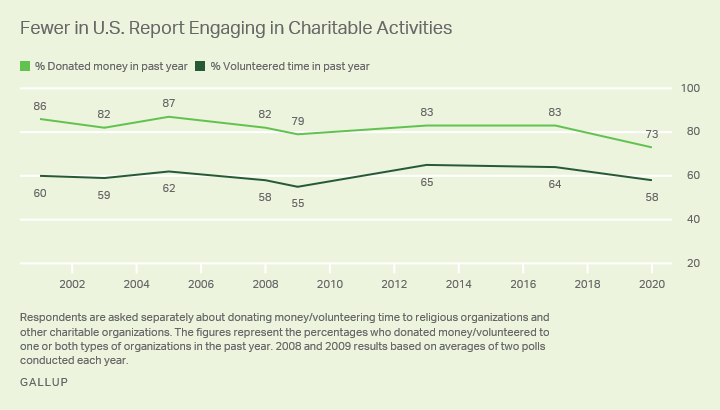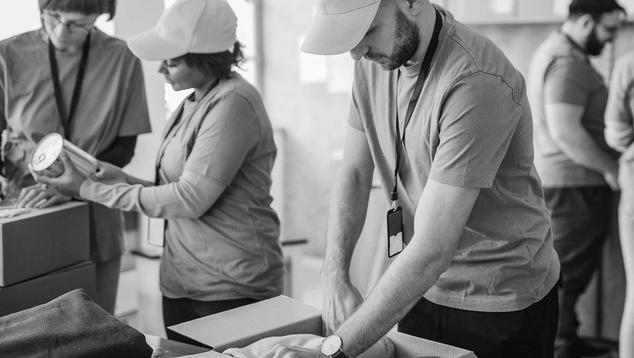As companies around the world struggle to regain their footing in a post-COVID-19 world, philanthropic organizations are also facing an entirely new landscape. Philanthropies that rely on individual, institutional and corporate giving don't know if or when such support will return to its pre-coronavirus levels. In the meantime, these organizations must fundamentally change their operating models to survive and thrive in the new environment.
Recent Gallup polling conducted amid the coronavirus pandemic (from April 14-28) offers mixed signals on Americans' charitable activities. Americans' self-reports of whether they have donated money (73%) or volunteered their time (58%) to a charitable organization in the past year are down sharply from the prior readings in 2017. Indeed, the 73% saying they donated money is a record low in Gallup trends over the past decade.

As Gallup's Jeff Jones wrote in his analysis of the new data, there is evidence in the trends of a "recency bias" in how Americans answer this question. That is, if they are thinking of their recent charitable activity, rather than the entire past year, today's lows could reflect declines in giving and volunteering since the pandemic began. At the same time, the 2017 tax law that reduced the tax incentive for charitable giving must also be considered.
Still, only 7% of Americans say they plan to decrease their donations in the coming year, while 25% plan to increase them and 66% say their donations won't change. But with 30% of Americans reporting direct financial harm from COVID-19, through loss of a job, or hours or pay reduction, philanthropic organizations must prepare for shrinking donations as these losses sink in. Also, more individuals will experience financial setbacks the longer the pandemic continues.
Philanthropic organizations not only rely on charitable contributions to serve their mission but also look to harness volunteerism and community engagement. If volunteerism was indeed down before the coronavirus pandemic, the future of volunteerism as social distancing becomes the norm is even more worrisome.
Philanthropic Organizations Must Adapt
While the coronavirus pandemic poses an acute challenge for all organizations, philanthropic organizations must contend with significantly reduced charitable donations, as well as social distancing measures that limit effective, in-person volunteer experiences. There are three key imperatives for philanthropic organizations to thrive in this unique environment.
-
Develop a digital strategy to engage constituencies remotely
Americans are abiding by social distancing measures at high levels and remain cautious about interacting with groups of people. Many philanthropic organizations rely on in-person experiences to engender support for their mission, cultivate donors and secure gifts.
Successful philanthropic organizations will need to quickly pivot to digital strategies to market their mission and advocacy agenda, facilitate connections with other volunteers and beneficiaries, and maintain effective governance.
While many philanthropic organizations are experimenting with webinars and social media connections, others do not have the resources to provide high-quality digital communication and experiences. Given that competition for donor support is fierce, organizations will need to invest in new technologies and graphic design talent to create compelling content that stands out from other virtual offerings.
The next hurdle is figuring out how to convert viewers of great content into ongoing supporters of their mission.
-
Link giving strategies to digitalization
Many philanthropic organizations raise the majority of their funds through an events-based donation strategy focused on honorees and corporate support. Some organizations rely on a grassroots strategy with a focus on high-volume, small-dollar donations. Other organizations target high net-worth donors for a smaller number of large gifts and often provide exclusive experiences as a draw to attract these investments.
All of these strategies are challenged when social distancing reduces or eliminates the ability to engage in in-person events. The next frontier of philanthropy will demand transitioning to digital activities, including online fundraising campaigns and virtual auctions. Other approaches include creating a revenue model that includes virtual content, and crafting meaningful and elite donor experiences that can be accessed remotely. This environment presents a unique opportunity for organizations to mobilize their board and key supporters to launch virtual fundraising campaigns on their behalf.
-
Expand the pool of volunteers and donors
One benefit of a more digital strategy is the ability to attract volunteers and donors from a wider geography. The coronavirus situation allows philanthropic organizations to reach constituencies outside the communities of their physical offices. In this new environment, philanthropic organizations must shape their advocacy and mission orientation to meet local needs, while reaching out more broadly to attract new supporters.
A Case Study of an Organization in Transition: StreetWise Partners
Gallup supports a number of philanthropic organizations through its U.S.-based Community Builders program. One such organization is StreetWise Partners, a group that has served economically vulnerable adults for 23 years in New York City; Washington, D.C.; and Detroit. StreetWise provides young adults and skilled immigrants who are unemployed or working in low-wage, low-growth jobs with critical mentorship to unlock careers traditionally unavailable to them.
Current corporate support for StreetWise suggests that companies look for agility when choosing where to increase their donations and are especially interested in funding organizations that can remain responsive to community needs, particularly as they rapidly change during the pandemic.
The arrival of COVID-19 has led to additional barriers for StreetWise clients, including a contracted job market and reduced economic opportunities. According to data collected by StreetWise since the outbreak of the pandemic, 60% of StreetWise alumni report they have experienced a reduction in work hours or have been laid off, while 90% are fearful for their future job prospects and are eager for virtual learning experiences. Given these realities, there is higher demand for mentorship and workforce development support, while at the same time, key in-person events to raise funds for the StreetWise program have been canceled because of the pandemic.
StreetWise has shifted its in-person mentorship approach to a series of virtual programs that engages volunteers and clients in one-on-one employment support and emergency needs; virtual mock interviews; and a 13-week remote workforce mentoring program. Current corporate support for StreetWise suggests that companies look for agility when choosing where to increase their donations and are especially interested in funding organizations that can remain responsive to community needs, particularly as they rapidly change during the pandemic.
These early experiences highlight the opportunities and challenges of converting to a digital model. Allowing for virtual volunteering has dramatically increased the number of volunteer mentors who can participate in the program, and companies are eager to offer these experiences to their employees.
A key challenge in going virtual is limitations in existing software platforms to meet the needs of philanthropic organizations while maintaining safety and ensuring all virtual interaction is appropriate. In the race to digitize philanthropy, proprietary software that can meet the unique needs of charitable organizations is required. Virtual strategies require investment in new software and technology, and new staff skills (e.g., moderating Zoom breakout rooms) as well as changes in how nonprofit employees spend their time. For StreetWise, moving to a virtual approach allows for the elimination of geographic boundaries so mentors in New York City can help mentees in Detroit. This flexibility facilitates more efficient volunteer mentor recruitment and will ultimately allow more mentees to be served.
Implications
The StreetWise Partners story exemplifies the unique opportunities and challenges philanthropic organizations face as they respond to the coronavirus pandemic. In an environment of financial distress, decreased philanthropic giving and major barriers to volunteerism, the most successful organizations will pivot to digital strategies, figure out how to convert digital experiences into mission-amplifying interactions and turn digital enthusiasts into financial supporters.
For more information about this study, read the story on news.gallup.com.




